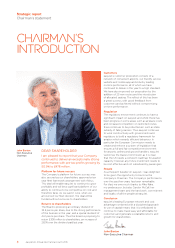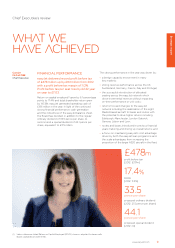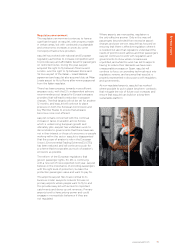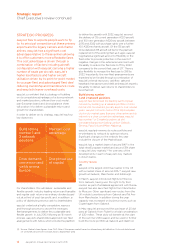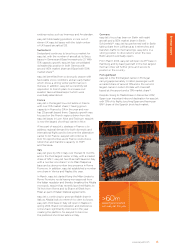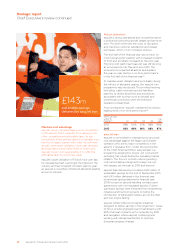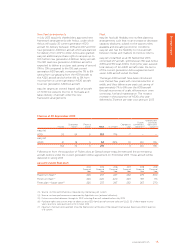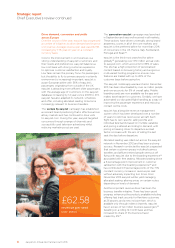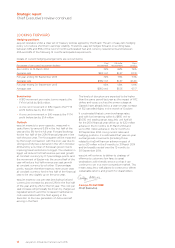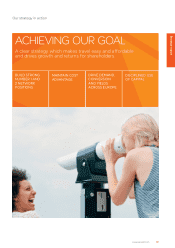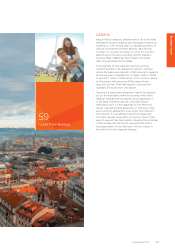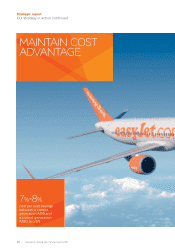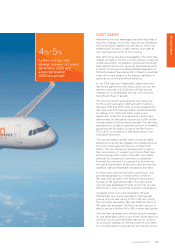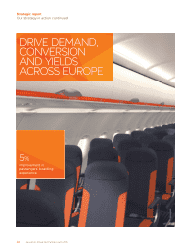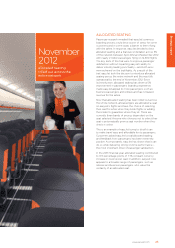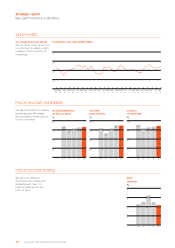EasyJet 2013 Annual Report Download - page 20
Download and view the complete annual report
Please find page 20 of the 2013 EasyJet annual report below. You can navigate through the pages in the report by either clicking on the pages listed below, or by using the keyword search tool below to find specific information within the annual report.
18 easyJet plc Annual report and accounts 2013
Strategic report
Chief Executive’s review continued
LOOKING FORWARD
Hedging positions
easyJet operates under a clear set of treasury policies agreed by the Board. The aim of easyJet’s hedging
policy is to reduce short-term earnings volatility. Therefore, easyJet hedges forward, on a rolling basis,
between 65% and 85% of the next 12 months anticipated fuel and currency requirements and between
45% and 65% of the following 12 months anticipated requirements.
Details of current hedging arrangements are set out below:
Percentage of anticipated requirement hedged
Fuel
requirement
US dollar
requirement
Euro
surplus
Six months to 31 March 2014 76% 82% 76%
Average rate $991 m/t $1.57 €1.19
Full year ending 30 September 2014 72% 79% 73%
Average rate $982 m/t $1.57 €1.20
Full year ending 30 September 2015 56% 58% 54%
Average rate $950 m/t $1.56 €1.17
Sensitivities
• A $10 movement per metric tonne impacts the
FY’14 fuel bill by $4.8 million.
• A one cent movement in £/$ impacts the FY’14
profit before tax by £1.2 million.
• A one cent movement in £/€ impacts the FY’14
profit before tax by £1.4 million.
Outlook
easyJet expects to grow capacity, measured in
seats flown, by around 3.5% in the first half of the
year and by 5% for the full year. Forward bookings
for the first half of the 2014 financial year are in line
with the prior year. The first quarter will be impacted
by the tough comparison with the prior year due to
strong post-Olympics demand in the UK in October
2012 and by a number of European governments
imposing travel restrictions to Egypt. The situation in
Egypt will reduce first half revenue per seat growth
at constant currency by 0.7 percentage points, and
the movement of Easter into the second half of the
year will reduce first half revenue per seat growth
at constant currency by a further 1.5 percentage
points. easyJet therefore expects revenue per seat
at constant currency for the first half of the financial
year to be very slightly up on the prior year.
easyJet expects cost per seat (excluding fuel and
currency) to increase by around 2% for the first half
of the year and by 2% for the full year. The cost per
seat increase will principally be driven by charges at
regulated airports and the increased maintenance
costs associated with the fleet ageing in the
transition to the new generation of Airbus aircraft
arriving in the fleet.
The levels of disruption are expected to be higher
than the same period last year as the impact of ATC
strikes and issues such as the power outage at
Gatwick have already led to a year-on-year increase
of 152 cancelled flights in the month of October.
It is estimated that at current exchange rates
and with fuel remaining within its $950 m/t to
$1,050 m/t trading range, easyJet’s unit fuel bill
for the 2014 financial year will be up to £20 million
adverse in the 6 months to 31 March 2014 and
up to £50 million adverse in the 12 months to
30 September 2014. Using current rates and
hedging positions, it is estimated that year-on-year
exchange rate movements (including those
related to fuel) will have an adverse impact of
up to £10 million in the 6 months to 31 March 2014
and be broadly neutral over the 12 months to
30 September 2014.
easyJet will continue to deliver its strategy of
offering its customers low fares to great
destinations with friendly service so that it can
continue to win in a more competitive market. This
means easyJet is well placed to continue to deliver
sustainable returns and growth for shareholders.
Carolyn McCall OBE
Chief Executive


